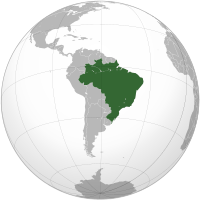Transgender rights in Brazil
| Part of a series on |
| Transgender topics |
|---|
|
t |
| Part of a series on |
| LGBT rights |
|---|
 |
| Lesbian ∙ Gay ∙ Bisexual ∙ Transgender |
|
|
Transgender rights in Brazil include the right to
Gender recognition
History
Before 2009
In 1993, the first Brazilian national meeting was held among transgender individuals.[1] This meeting was known as the National Meeting of Transvestites and Liberated People.[1] By 1995, gay and lesbian national meetings were being attended by transgender activist groups.[1] Then, in 1996, the National Meeting of Transvestites and Liberated People Fighting Against AIDS was held.[1]
Brazil participated in the drafting of the Statement on Human Rights, Sexual Orientation and Gender Identity. This document was presented in December 2008.[2] Brazil helped organize the launch of the Yogyakarta Principles in 2007.[2]
Since 2009
Changing legal
Unanimously, the 3rd Class of the Superior Court of Justice approved allowing the option of name and gender change on the birth certificate of a transgender person who has undergone sex reassignment surgery.
The understanding of the ministers was that it made no sense to allow people to have such surgery performed in the free federal health system and not allow them to change their name and gender in the
The ministers followed the vote of the
"The issue is delicate. At the beginning of compulsory civil registry, distinction between the two sexes was determined according to the genitalia. Today there are other influential factors, and that identification can no longer be limited to the apparent sex. There is a set of social, psychological problems that must be considered. Vetoing this exchange would be putting the person in an untenable position, subject to anxieties, uncertainty, and more conflict."[6]
According to Minister

Since 2018
The
In 2020, a study was conducted to understand the quality of life of Brazilian transgender children.[9] 32 participants were involved in the study, and they were either interviewed or placed into focus groups to gather their perspective.[9]
Gender reassignment surgery
The first male-to-female gender-affirming surgery in Brazil was Performed by Dr. Roberto Farina in the 1970s. He was prosecuted for his actions but was eventually acquitted of all charges in 1979.[10]
In 2008, Brazil's public health system started providing free
The Regional Federal Court agreed, saying in its ruling:
"from the biomedical perspective, transsexuality can be described as a sexual identity disturbance where individuals need to change their sexual designation or face serious consequences in their lives, including intense suffering, mutilation and suicide."
Patients must be at least 18 years old and diagnosed as transgender with no personality disorders, and must undergo psychological evaluation with a multidisciplinary team for at least two years, begins with 16 years old. The national average is of 100 surgeries per year, according to the Ministry of Health of Brazil.[12]
Transgender Discrimination
There were about 200 homicides of transgender individuals in Brazil in 2017, according to the Brazilian National Transgender Association.[13] Additionally, Brazil made up 40% of all murders of transgender individuals since 2008, according to Transgender Europe.[13] More recently, the number of transgender women murdered in Brazil went up 45% in 2020.[14]
Sao Paulo city council member Erika Hilton, the first transgender woman to be elected to the city council, received death threats and, as a result, had to change her habits for safety reasons.[14]
See also
- LGBT rights in the Americas
- LGBT rights in Brazil
- Legal status of transgender people
- List of transgender-related topics
References
- ^ ISBN 978-0-8229-7371-3.
- ^ JSTOR 44861146.
- ^ Transgenders can change their name, as decided by the Supreme Court of Justice (in Portuguese)
- ^ Gender reassignment surgery is free in Brazil (in Portuguese)
- ^ Jurisprudence of the Changing legal gender assignment in Brazil by Superior Court (in Portuguese)
- ^ The Superior Court of Justice allows transsexuals to change name and sex on birth certificate (in Portuguese)
- ^ Legal change of name in Brazil (in Portuguese) Archived 23 December 2009 at the Wayback Machine
- ^ Transexuals can now change their names in documents at registry offices throughout the country (in Portuguese)
- ^ PMID 33174991.
- ^ Rodrigues Vieira, Tereza (1998). "Mudança de Sexo: Aspectos Médicos, Psicológicos e Jurídicos". Akrópolis - Revista de Ciências Humanas da UNIPAR. 6 (21): 3–8 – via Open Journal Systems.
- ^ Sex-change in Brazil (in Portuguese)
- ^ "Brazil to provide free sex-change operations (in English)". Archived from the original on 24 April 2013. Retrieved 23 April 2013. Brazil to provide free sex-change operations (in English)
- ^ S2CID 40520214.
- ^ a b Nugent, C. (2021). Erika Hilton. Time International (Atlantic Edition), 198(15/16), 91. https://ezproxy.gl.iit.edu/login?url=https://search.ebscohost.com/login.aspx?direct=true&db=a9h&AN=159398591&site=ehost-live


